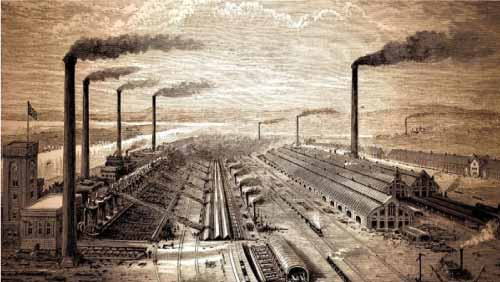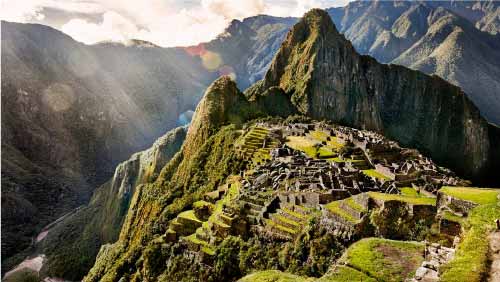The Industrial Revolution was a period of rapid industrialization and technological progress that began in eighteenth-century Britain and then spread to other parts of the world. It was a major turning point in human history and had profound effects on the world’s economy, society and culture.
During the Industrial Revolution, many new machines and technologies were invented that transformed the way people worked and lived. Innovations such as the steam engine, cotton gin, and jenny spinning machine made it possible to produce goods on a much larger scale and with greater efficiency than ever before.
The Industrial Revolution also led to major social changes. As more people moved from rural areas to cities to work in factories, urbanization increased and new social classes emerged. The rise of industrial capitalism and the growth of factory-based production led to the development of new labor practices and the rise of the labor movement.
The Industrial Revolution had a lasting impact on the world and paved the way for many of the technological advances we take for granted today. However, it also had some negative consequences, such as environmental pollution and social inequality, and remains a subject of debate and study in many fields.
Origin and diffusion
The Industrial Revolution began in Britain in the mid-eighteenth century, with the development of the steam engine and the mechanization of textile production. It then spread to other countries in Europe and North America, and later to other parts of the world, such as Japan.
Technological innovations
The Industrial Revolution was characterized by a series of technological innovations that transformed the way goods were produced, including the steam engine, spinning machine, power loom, and cotton gin. These innovations led to the development of new industries, such as textiles, steel and transport.
Urbanization
The growth of factories and new industries led to the development of urban areas, as people moved from rural areas to cities in search of work. This led to the growth of cities and the emergence of new social classes, such as the industrial working class and the bourgeoisie.
Labor Practices
The rise of factory-based production led to the development of new labor practices, such as the use of wage labor and the division of labor. These practices were often harsh and exploitative, leading to the rise of the labor movement and the development of new ideas about workers’ rights.
Environmental impact
The Industrial Revolution had a significant impact on the environment, with the growth of factories and the use of new technologies leading to further pollution and degradation of natural resources. This has been an ongoing challenge for industrial societies to this day.
Overall, the Industrial Revolution was a major turning point in human history, with lasting impacts on the world’s economy, society, and culture. It ushered in a new era of technological progress and innovation, but it also posed significant social and environmental challenges and costs.
Transport
The Industrial Revolution also had a major impact on transportation, with the development of new technologies such as the steam locomotive and the steamboat. This made it possible to transport goods and people more quickly and efficiently, which in turn helped drive economic growth and industrialization.
Communication
The Industrial Revolution also saw the development of new communication technologies, such as the telegraph and telephone, which allowed people to communicate more easily and quickly over long distances. This also helped connect different parts of the world and facilitated the growth of world trade.
Global impact
The Industrial Revolution had a major impact on the global economy, as new industries and technologies spread around the world. This led to the growth of new economic powers and the decline of older ones, such as the fall of the Ottoman Empire and the emergence of the United States as an industrial power.
Intellectual and cultural impact
The Industrial Revolution also had a significant impact on intellectual and cultural life, with the development of new ideas and movements such as liberalism, socialism and romanticism. This was a period of great creativity and innovation in the arts, literature and philosophy.
Long-term effects
The Industrial Revolution had long-term effects on the world’s economy, society, and culture. It set the stage for the development of modern capitalism, created new social and economic structures, and contributed to the rise of modern nation-states. It also had significant environmental impacts, such as the depletion of natural resources and the contribution to climate change.
Overall, the Industrial Revolution was a complex and transformative period in human history, with far-reaching impacts on many aspects of life. It remains a subject of study and debate among scholars in many fields, and continues to shape the world we live in today.
Gender roles
The Industrial Revolution had a significant impact on gender roles, with the growth of production in factories generating new opportunities for women to work outside the home. However, this also led to new forms of gender inequality, as women were paid less than men and subjected to harsh working conditions.
Colonialism
The Industrial Revolution also had a significant impact on colonialism, with the rise of industrial capitalism leading to the expansion of European empires and the exploitation of colonized peoples and resources. This also led to the development of new forms of resistance and anti-colonialist movements.
Science and technology
The Industrial Revolution was a period of great scientific and technological progress, with new discoveries and innovations in fields such as chemistry, physics, and engineering. This helped drive economic growth and transform many aspects of daily life.
Health & Medicine
The Industrial Revolution also had a significant impact on health and medicine, with the growth of cities and factories generating new public health challenges and the development of new technologies and medical practices.
Ongoing impact
The Industrial Revolution continues to have an impact on the world today, with many of its legacies and consequences still shaping the social, economic and environmental problems of the modern world.
Overall, the Industrial Revolution was a complex and transformative period in human history, with a wide range of economic, social, cultural and environmental impacts. It remains an important topic of study and debate, and its legacies and consequences continue to shape the world we live in today.


